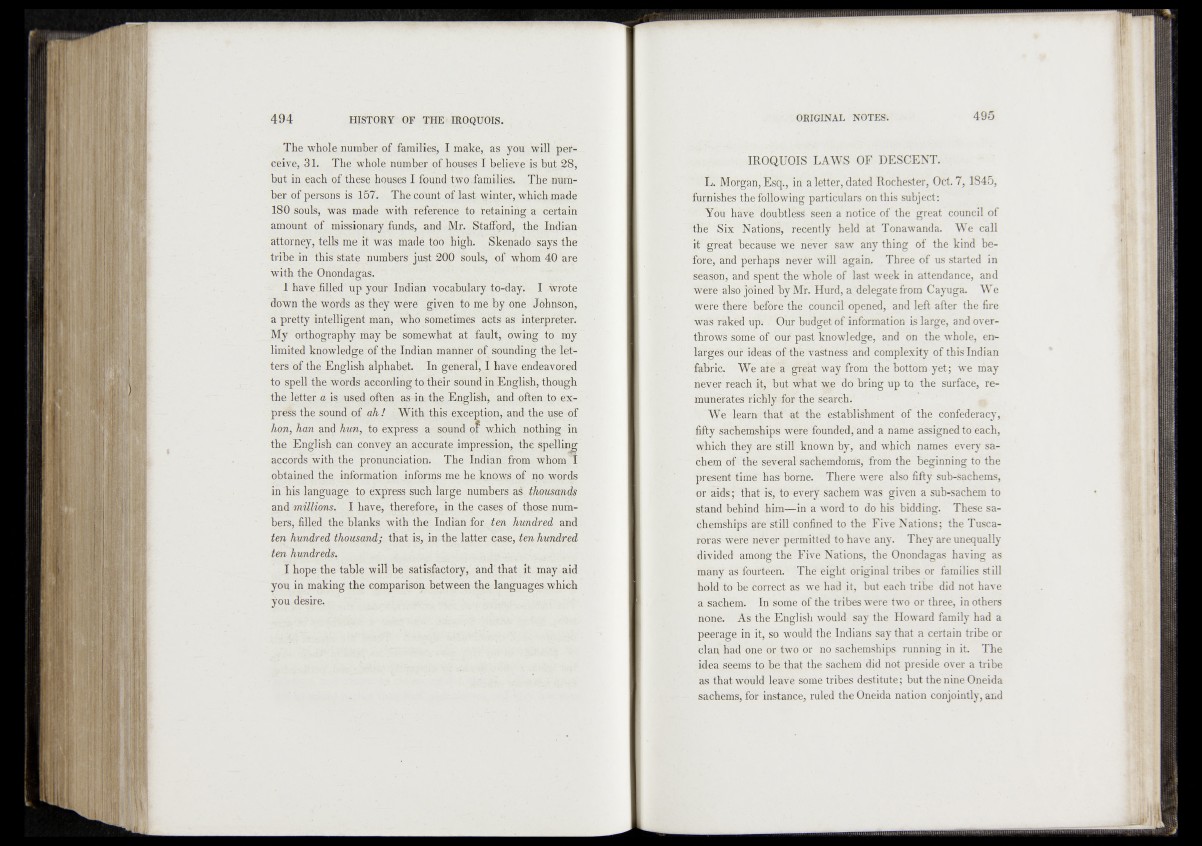
The whole of families, I make, as you will get*
ceive, -31. The whole number of houses T heli evg 'isbut; 28,
hut ih each o£ .these houses I found two.families. The number
of persons is 157. The ccftfot of Jast Rioter, which jnade
180 souls, was made with reference to retaining, a certain
amourit. of missionary funds, and Mr. . Stafford, the Indian
attorney, tells me it was madé too high. Skenado says the
tribe in this state numbers just 200 soufe; \of whom 40 are
with the Ononda'gas.
T have filled up’ your Indian vocabulary to-day. I -forote
down the words as they were '.given tofne by ode JobnsönV
a pretty intelligent man, who sometimes acts as interpreter.
My orthography may be somewhat at faulty owing to my
limited knowledgebf the Indian manher o f sodding the letters
bf the'Engird alphabet. „Jin. general, I baye endeavored
to spell the words aeeording to their sóund inJSngJish, though
the létter $ j s used often as4n, the English, and -often to ex-
p r ^ the sound of ah! With this exception,.and the .use of
Aon, Aon and Ann, to express a sound oT which nothings in,
the English can convey an, accurate impress,ion-, the spelling
accords with the pronunciation; The Indian. Jr oin whom I
obtained .the information informs me he knows o f no words
in his language to express such large numbers a! thousands
and millions. I have, therefore, in the case§ of those numbers;
fifted the btanks with the Indian for ten hundred' and
ten hundred thousand; that is, in- the latter case, ten hundred
ten hundreds,
I hope the table w ill be satisfactory, and fhat it may aid
yon in making the comparison between the languages which
you desire,
IROQUOIS LAWS OF DESCENT.
L. Morgan, Esq*,’ in; a letter, dated Rochester, Oct. 7,1845,
furnishes fhe following particulars on this subject:
You haiife' doubtless seen a notice of the great council of
the' Six 1 Nations, recently held at Tonawanda. We call
it great because we never saw any thing of the kind before,
and perhaps nevèr will again. Three of us started in
season, arid spent' the' whole of last week in attendance, and
Were also'jolned by Mr. Hurd, a delegate from Cayuga. We
were there' before the council opened, and left after the fire
was raked up; Our budget of information is large, and overthrows
Sóme of' our past knowledge, and on the whole, enlarges
bur ideas of-the vastnéss and complexity of this Indian
fabric. We affe 'd grèat way from the bottom yet; We may
rfover reach if, 'but vfhat |É | do bring up to the surface, remunerates
richly for the search.'
We learn that at the establishment of the confederacy,
fifty sachelnships were founded, and a name assigned to each,
Which they are still known by,; and which names every sä-
chem of the several sachemdoms, from the beginning to the
present time has borne. There were also fifty sub-sachems,
or aids ;’ that is, to*every sachem was given a sub-sachem to
stand behind -him—in'a word to do his bidding: These sa-
chemships are still confined to the Five Nations; the Tusca-
roras Were never permitted to have any. They are unequally
divided amohg the Five Nations, the Onondagas having as
many as fourteen. The eight original tribes or families still
hold to be Correct as we had it, but each tribe did not have
a sachem. In Some of the tribes were two or three, in others
nonè. As the Ebglish Would say the Howard family had a
peerage in it, so would the Indians say that a certain tribe or
clan, had one or two or no sachemships running in it. The
idea seems to be that Jhe sachem did not preside over a tribe
as that would leave some tribes destitute; but the nine Oneida
sachems, for instance, ruled the Oneida nation conjointly, and